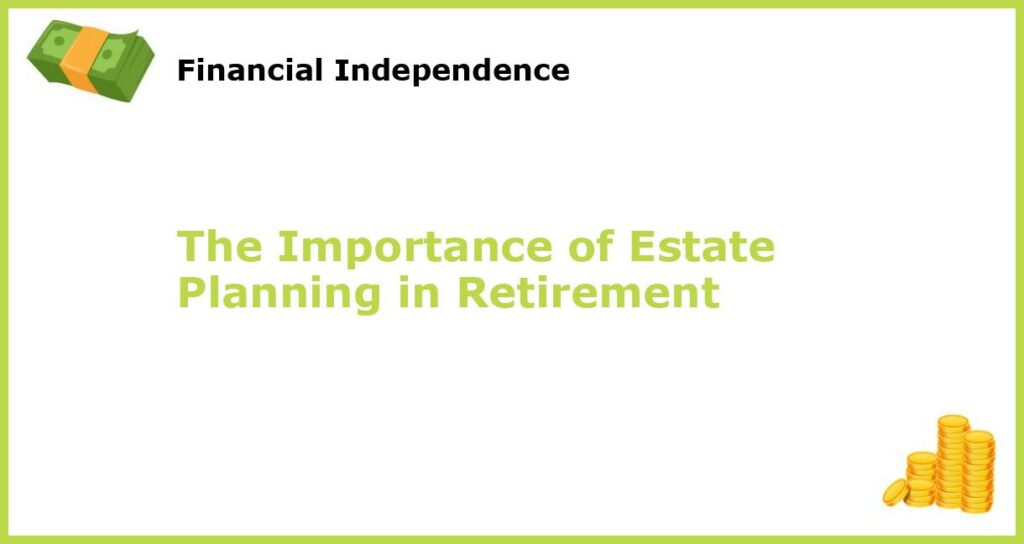Welcome to our article discussing the importance of estate planning in retirement. People often associate estate planning with those who have a lot of money or those nearing the end of their life, but it is actually an important process for anyone who wants to ensure that their assets are distributed according to their wishes. Let’s dive deeper into this topic to understand why estate planning is so crucial.
What is estate planning?

Estate planning is more than just creating a will – it’s the process of planning for the distribution of one’s assets after their death. Estate planning can include creating a trust, choosing beneficiaries for retirement accounts, life insurance, and designating powers of attorney for healthcare or finances. This step-by-step process, which often involves a financial planner or attorney, can help you address all of your individual needs and generate the optimal plan to distribute your assets.
Why is estate planning important?

The primary purpose of estate planning is to ensure that your assets are distributed according to your wishes when you’re no longer here. However, one significant benefit of estate planning is minimizing estate taxes and avoiding costly legal battles. If your estate plan is not in place or not comprehensive, your beneficiaries may not receive their inheritance, resulting in litigation and additional complications for your loved ones. You can avoid this added stress by consulting with a financial planner or attorney to create a comprehensive plan.
What happens if you don’t have an estate plan?

If you do not have an estate plan in place, the state will decide how best to distribute your assets. This means that your estate may go through probate, which can be lengthy and expensive, leaving your loved ones with additional stress and challenges. Additionally, state laws may not distribute your assets as you would have wanted. Estate planning puts you in control of your assets and ensures that your wishes are fulfilled.
When should you start estate planning?

The earlier you start estate planning, the better. In your 20s or 30s, you may feel that you have nothing substantial to plan for, but significant changes can occur in life. A properly implemented financial plan can erect a strong pillar of financial safety for your future. So, it is always better to begin the process now. Even if you are retired, it’s never too late to start. Trusts and other elements of a comprehensive estate plan can help you maximize the value of your assets and minimize tax burdens.
What should you include in your estate plan?

Your estate plan should start with a will or trust, outlining the distribution of your assets. You should also include a durable power of attorney for healthcare decisions and finances, a healthcare proxy, and a living will, which outlines your wishes for medical care if you become incapacitated. When creating your estate plan, it’s important to review it regularly and update it when necessary. Ensure that your estate plan reflects your current wishes and addresses any changes in your financial or personal situation.
How can estate planning help minimize taxes?
Estate planning can be useful for minimizing estate taxes by reducing the value of your assets. It involves setting up trusts that can provide tax benefits and taking advantage of various tax exemptions. Gifting assets to your loved ones while you’re still alive is another way to reduce the overall value of your estate. For instance, you can gift up to $15,000 per year to a single person without triggering federal gift and estate taxes.
What is a living will?
A living will is a legal document that outlines your wishes for end-of-life medical care. In a living will, you can specify whether or not you want to receive life-sustaining treatments or resuscitation procedures or opt for palliative care. You need to discuss your wishes with your family and physician so that your desires are understood and followed in case a situation arises that calls for immediate action.
What is a trust?
A trust is a legal arrangement in which a trustee holds and manages assets on behalf of a beneficiary. Setting up a trust allows you to minimize taxes and protect assets from creditors. You can designate a trustee that takes the lead on handling the assets and any financial or legal decisions related to them. It is a useful tool for managing assets posthumously and carrying out your wishes for your asset distribution.
How can you involve your family in the estate planning process?
It’s important to involve your family in your estate planning process so that they understand your wishes, can be helpful support companions, and can help carry out your desired plans. You can share your estate plan with them, set up trusts with beneficiaries, designate financial decision-makers or powers of attorney, and hold discussions with them, which allows for a better understanding of why you have made certain decisions.
What are some common estate planning mistakes?
Many people tend to overlook incapacity planning in their estate planning which is critical. To avoid this, ensure your estate plan allocates for a power of attorney for healthcare and finances while including living will-related decisions. Update your estate plan periodically as life changes. Ensure your estate plan addresses each of your assets thoughtfully, so each is distributed as intended, such as when the recipient is going through a bankruptcy or a divorce. Your estate plan is a key tool for ensuring that your legacy and wishes live on after you.







